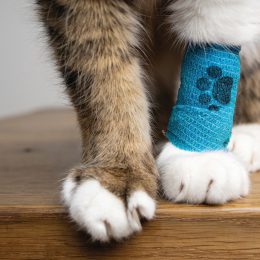
The Purdue University Small Animal Hospital provides 24/7 assistance and a referral practice for questions and concerns about your pet. 765-494-1107, or visit: https://www.purdue.edu/vet/vth/small-animal/.
Many a cartoon shared among cat lovers on Facebook depicts skeletal remains of cat owners who died rather than upset snoozing kitties, still on their laps. While “cat naps” are part of a cat’s nature, if your cat becomes lethargic, he can be suffering from or heading to the same health issues inactive humans develop or have: heart disease.
Cats tend to mask signs of illnesses better than dogs, and, therefore, they go longer without detection. Since early detection is key to treatment, here are some signs of heart issues to look out for in cats:
Vomiting. While coughing is a major symptom of heart disease in dogs, it does not often occur in cats. Cats, however, do vomit as a result of heart disease.
Labored breathing. Your cat may experience shortness of breath or begin to breathe more rapidly than usual.
Blood clots. Often blood clots are the first noticeable sign of feline heart disease. Most frequently, it is “saddle thrombus,” by which a blood clot lodges at the end of the aorta and cuts off proper blood supply to the hind legs. Symptoms are pain and the inability to walk normally on the hind legs.
Depression/Withdrawal. Your cat may begin acting depressed or isolating itself.
Poor appetite. A cat will not suddenly lose its appetite for no good reason. There will almost always be a larger cause behind a poor appetite.
Physical changes. While weight loss is definitely a symptom of heart disease, weight gain can be, too. More likely than weight gain is a bloated or distended abdomen.
Lethargy. Cats nap a lot under normal conditions, but yours may appear less playful or tire more easily.
While most feline heart issues have origins that are either genetic or unknown, some are caused by such things as hyperthyroidism, high blood pressure, gum disease, or heartworms.
Many pet owners don’t realize that protection from heartworms is as important for cats, even indoor cats, as it is for dogs. While heartworm disease in dogs presents itself as heart failure, cats are typically only infected with one or two heartworms. Heartworm larval migration to a cat’s heart can cause changes in the pulmonary arteries that can trigger a debilitating or even fatal asthma-like condition. Heartworms can also cause a fatal artery blockage.
All of this adds up to making sure your kitty visits the vet for its annual examination. If the vet hears a rapid heartbeat or murmur, or notices something else suspicious, he or she might suggest an X-ray or other tests to make sure your cat isn’t concealing a health problem that can be addressed immediately and, therefore, be more effectively treated.
Source: Purdue University College of Veterinary Medicine and petmd.com



